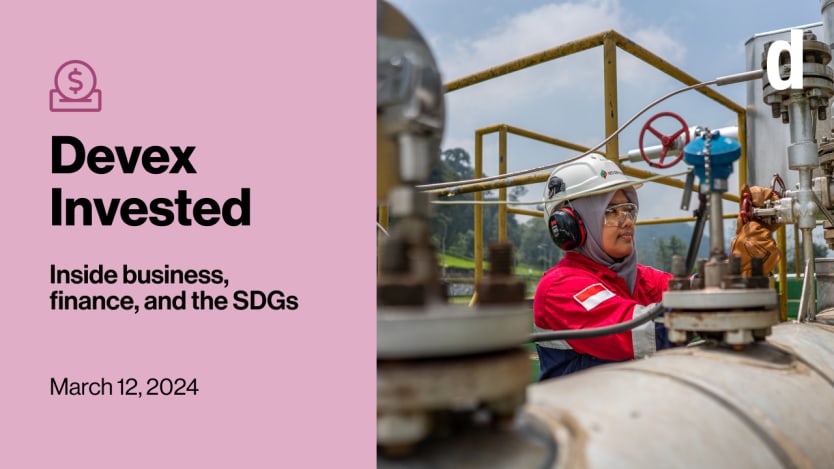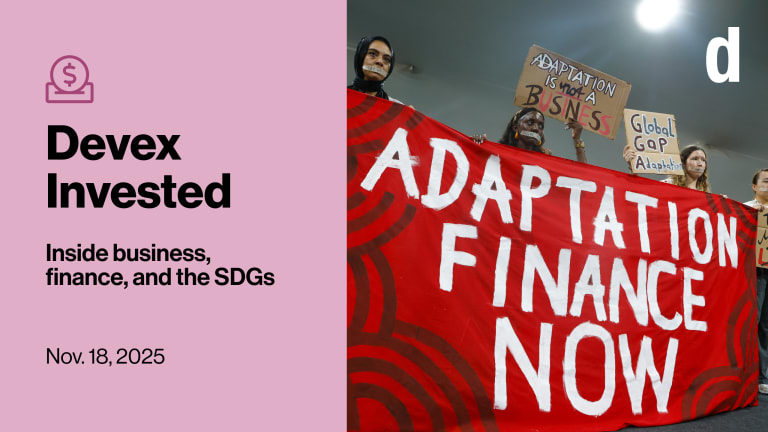
It’s no secret development banks are trying to move the needle on climate finance, especially adaptation work to help countries address the effects of climate change.
But when the Asian Development Bank released its 2023 climate finance figures earlier this year, it looked like the Manila-based lender had not just moved the needle but blown it off the scale.
This is a preview of Devex Invested
Sign up to this weekly newsletter inside business, finance, and the SDGs, in your inbox every Tuesday.
From $6.7 billion worth of climate finance in 2022, ADB reported commitments of $9.8 billion in 2023. And the jump in adaptation (rather than mitigation) projects, was equally stark — from $2.7 billion in 2022 to $4.3 billion last year.
To learn how they did it, we spoke with Warren Evans, ADB’s special senior adviser on climate change. He walked us through the cultural and procedural changes the bank has made in recent years. And he was also candid that most of the $4.3 billion in adaptation finance for 2023 comes through sovereign loans to governments, rather than seeking revenue-generating adaptation projects.
“This is where I think many in the West get it wrong,” Evans tells me. “They think of adaptation as something that you invest in for generating a revenue stream. The flip side of that is if you don't invest in building resilience, all you're gonna get is more of the same of what we saw in Pakistan, the droughts, the floods, all the disasters that we see.”
The flip side of that, however, is how to avoid further indebting countries that are facing the brunt of a climate crisis they did little to cause.
Harjeet Singh, global engagement director for the Fossil Fuel Non-Proliferation Treaty Initiative, tells me that "in a world where adaptation finance is crucial for resilience, it is deeply troubling that [ADB] provided less than 4% as grants, while a staggering 95% looms as loans, further entrenching the debt crisis in developing nations.”
For Evans, as Devex Pro members can read below, there is no denying the need for more grant financing either. “It's justified, it’s real, and there's not nearly enough of it,” he tells me. “That's the biggest problem we've got.”
Read: The strategy behind ADB's massive climate finance numbers (Pro)
Background reading: Asian Development Bank's $15B big bet on new climate scheme (Pro)
+ With a Devex Pro membership, you can access all our expert analyses and reporting, insider insights, career resources, exclusive events, and more. Not a Pro member yet? Start your 15-day free trial now.
China: beyond the stereotypes
Seeking to move beyond the debt-trap diplomacy caricature by which it is often known in the West, my colleague Michael Igoe recently hosted a call for Devex Pro members on the nuances of China’s foreign spending.
Pro members can watch the full session and catch up on some of the takeaways here. Among them:
• There is now greater monitoring and evaluation in Chinese development projects, with Chinese delegations traveling to European and United States donor agencies to learn about monitoring and evaluation approaches.
• There are fewer big-ticket infrastructure projects, replaced by more emphasis on exporting the standards and systems that operate alongside physical infrastructure.
• Chinese spending is more demand-driven than that of its Western rivals, for better and for worse. For example, Chinese aid spending is more likely to end up in the birth regions of African political leaders — an outcome that does not hold for traditional donors such as the World Bank.
Watch: How is China’s foreign aid changing? (Pro)
+ On March 18, join us for our next Devex Pro Leader Roundtable event featuring leaders in the gender equality space to discuss a range of issues affecting progress on SDG 5 including challenges created by the political and funding situation.
Africa reimagined
Speaking of caricatures, Hannah Wanjie Ryder and Trevor Lwere of the African development consultancy Development Reimagined argue that it’s time to retire the idea of Africa as too risky for private investors. And they have a hard-headed take on the idea of good governance as a barrier.
“History demonstrates that many countries with less-than-ideal leadership can experience rapid economic growth,” the pair write in an opinion piece for Devex. “For instance, many countries in East Asia were dogged by acute political instability and significant corruption when they experienced miracle growth in the second half of the last century.”
With six of the world’s 10 fastest-growing economies in 2024 being African, as was the norm prior to the pandemic, Ryder and Lwere argue that “Africa could be the next miracle and the savior of the world economy.”
Opinion: Time to switch lazy caricatures of Africa for investment bids
Came in like a wrecking ball
It’s been a tumultuous start to the year (by Brussels standards) in the de facto capital of the European Union, as the “bubble” gears up for European elections in June. That’s seen a swath of green or progressive policies from pesticides to alcohol labeling hastily sacrificed on the bonfire of political expediency in order to stave off (or so the logic goes) a feared lurch to the far right.
One file under intense scrutiny this week will be a corporate due-diligence law that attempts to force firms to act on worker exploitation and environmental harm outside Europe. As my colleague Rob Merrick reports, the Corporate Sustainability Due Diligence Directive, or CSDDD, was due to be approved last week but is now hanging in the balance after Germany, France, and Italy pulled support.
NGOs and supportive lawmakers are now trying to save any law at all, after some EU countries took the rare step of withdrawing their support for the text after the formal negotiations between the European Parliament, European Commission, and member states in the council had finished.
Now there is still haggling over which sectors are covered as well as thresholds for how many employees and how much annual turnover companies must have before they are caught by the changes.
The latest thinking is we should have an outcome by the end of the week, but whatever happens, the aftershocks of this one on the inter-institutional power balance (i.e. notably whether EU countries take any heed of the elected European Parliament) will be felt for years.
Read: 'Wrecking ball' hits EU plans to curb global supply chain abuses
IDB digs deep
The Inter-American Development Bank has secured a $3.5 billion capital increase from shareholders for its private sector arm, IDB Invest, with IDB President Ilan Goldfajn telling the Financial Times that the bank overall could increase lending by $112 billion over the next decade.
The changes, agreed Sunday at the bank’s annual meeting in the Dominican Republic, include fewer, bigger loans and more focus on measuring outcomes, FT reports.
U.S. Treasury Secretary Janet Yellen said in a statement that IDB Invest’s “new approach to risk sharing with the private sector and new instruments position it well to drive sustainable, inclusive, and long-term growth and job creation throughout the region.”
Background reading: What’s at stake as IDB Invest seeks a capital increase
What we’re reading
Major U.S. banks leave a global environmental and social standards group. [Devex]
The U.S. Securities and Exchange Commission adopts rules to enhance and standardize climate-related disclosures for investors. [SEC]
The World Bank embraces digital transformation. [Devex Pro]
A rotten system for sovereign debt restructuring needs fixing. [Financial Times]
Science-Based Targets initiative axes net-zero commitments of more than 200 companies. [Real Economy Progress]








